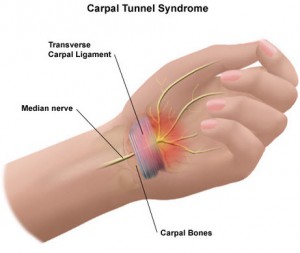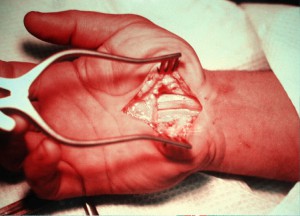According to the Bureau of Labor Statistics, tendonitis causes more than 70,000 people to miss work per year. This is just one of many reasons why it is important to understand the symptoms of tendonitis so that you can avoid not only the pain but the inconvenience it...
LATEST BLOGS
Husband and Wife of 54 Years Undergo Joint Replacement Surgeries On The Same Day
Premier Orthopaedics surgeon, Dr. Jonathan Garino, performed back-to-back procedures on a couple who have been married for 54 years! They shared their same-day surgery journey at the MUVE Center with @6ABC. Watch the incredible story below. Read the full ABC6 story...
What are Non-Surgical Treatment Options for a Herniated Disc
The spine consists of 26 bones called vertebrae and between them are cushion-like pads called “intervertebral discs”. The discs serve as shock absorbers for the vertebrae and help provide stability to the spine. When one of these intervertebral discs loses its normal...
Combating Carpal Tunnel Syndrome at the Office

Sitting down for around eight hours per day, five days a week isn’t that good for us, and yet that’s what the average office worker does. Factor in the fact that the vast majority of that time is spent working on a computer, and the risk of musculoskeletal problems increases, especially as “how to sit down safely” isn’t helped by the average work station. Ideally, Mr. or Ms. Average Office Worker would then go home and do something completely unrelated, but there’s a good chance they’ll sit down at a computer or games console at home, still carrying out repetitive hand movements, and probably at a considerably less ergonomically designed desk than their workspace.
What is carpal tunnel syndrome?
Human beings are poorly-designed in the hand and wrist area, and carpal tunnel syndrome is caused by compression of the median nerve, which controls movement and sensation in the hand and wrist. It can be inherited, and can appear during pregnancy, but can also be caused by repetitive movement in the hands and fingers, such as long bouts of typing, gaming, texting, and even craft activities like embroidery and cross-stitch. Symptoms include (but are not limited to) numbness in the fingertips (the little finger is usually unaffected), thumb weakness, and pain not just in the hand and fingers, but often in the arm and even up to the shoulder joint. Symptoms are frequently much worse at night, so sufferers can also end up sleep-deprived.
How is it treated?
The first treatment options are often splints to be worn at night to immobilize the wrist joint, and, if the patient is overweight, a diuretic to reduce any fluid compression on the carpal tunnel itself. In mid to severe cases, steroid injections or carpal tunnel release surgery may be carried out.
How can it be prevented?
As with all medical conditions, prevention is far better than cure:
- Set up office and home workspaces carefully – use wrist rests, and use split keyboards and a side-slanted/vertical mouse, both designed for use by RSI and carpal tunnel sufferers to reduce and relieve symptoms.
- Limit repetitive activity – screen breaks for the eyes should also be hand breaks for the wrists! Spending break periods texting or gaming will only exacerbate any underlying problems.
- Exercises – stretch arms out in front and with locked elbows, hold hands up as though to stop traffic for a few seconds, relax hands and fingers, make a fist with wrists bent.
- Take the lazy way – use voice recognition software where possible when typing, and instead of texting or using repetitive hand movements on phones and tablets, use the voice activated knowledge software.
- Numbness and tingling can be alleviated by hanging hands straight down by the sides and wriggling fingers.
- The Alexander technique and other posture-retraining therapies can help poor upper body alignment, and reduce the risk of carpal tunnel developing or getting worse.
Carpal tunnel symptoms should never be ignored; they can often be an indicator of another underlying condition which may require medical investigation and treatment in its own right. Even if carpal tunnel is just carpal tunnel, leaving symptoms unchecked and untreated can lead to very weak hands and extreme pain.


